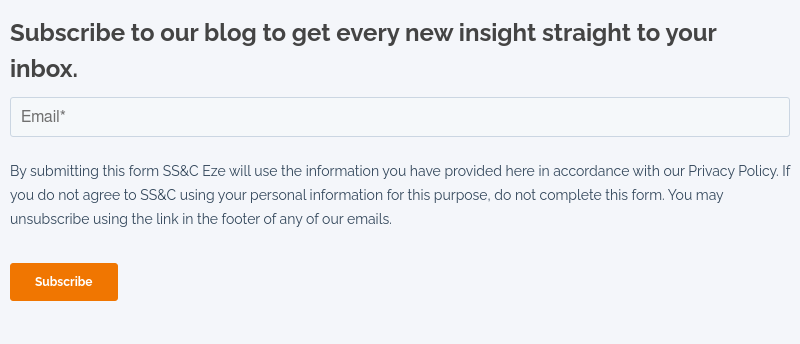Expensive maintenance fees. Costly upgrades. Overly manual processes.
If this sounds like your investment management technology experience, not only is it costing you time and money and damaging your bottom line, but it’s putting you in a vulnerable position to fall behind as your peers surge ahead. It’s time to look for a new investment management system. Now that you know you need a new system, it's about finding the right one for your firm, and there's a lot to consider. Doing vendor due diligence when evaluating new systems is crucial. But we get it; it's not easy, and the list of questions to contemplate during this process can be daunting. To help you out, we’ve compiled a list of questions frequently asked of us by investment managers doing vendor evaluations. Check out these questions, as well as our tips for what you should be looking for in a potential provider below.
Is it time to switch systems? Find out with this 4-question quiz.
Integrations
Will your platform integrate with our existing systems and any new systems we may want to add?
If you already have other systems in place, your new platform must integrate and scale with them; this will help you avoid the cost and workflow inefficiencies that come from a lack of cohesion among disparate systems.
The best vendors will use cloud, microservices, and API technology to create tight, cost-effective, and secure integrations, tying together workflows across systems and partners into a seamless end-to-end experience. Look for mentions of these types of technologies and integrations in your potential provider’s response.
Beyond your existing systems, the platform you choose should also be able to easily integrate with any new 3rd party vendors you may decide to add to your tech stack.
Service and Support
What is the size and structure of your service team?
First and foremost, choose a vendor that has a service team in place with the right expertise and experience to help you navigate any challenges you may face. To identify this type of team, look to the firm’s investment in its service group. They should invest heavily in both staffing and training.
Secondly, see how their service team is structured. Looking at the structure, you should feel confident you will receive 1:1 help when you need it, rather than being shuffled around from one overly-specialized team to another in search of a solution.
What are your hours of operation, and how quickly do you respond to inquiries?
Ideally, you should look for a service team that offers 24-hour support during all global market hours and services all major markets and time zones through a blend of geographically distributed and centralized support teams. However, if that’s not the case, at a minimum, make sure the service team is local and available during your hours of operation.
How knowledgeable is your service team on your products?
It may seem like common sense, but make sure you look for a vendor whose client service team is well-versed on how their systems work and who takes responsibility for cultivating software expertise in the context of your business.
What do you offer in terms of Managed and Strategic Services?
Whether or not you need these advanced service offerings now, knowing what a provider offers in terms of Managed and Strategic Services from the outset is incredibly valuable for times when you need additional support to navigate new business challenges, projects, or initiatives, want to augment existing resources, or are looking to offload critical business activities without the cost and hassle of onboarding an additional third-party vendor or increasing headcount.
For a more in-depth look at evaluating technology vendor service, check out this blog.
Reputation
Who are some of your current clients?
Do some research to see who makes up the vendor’s current client base. Make sure they are supporting firms with similar fund structures, asset classes, etc. It’s a good sign if the vendor is already serving similar customers, as they will have insight and expertise on the way your firm and workflows work.
How well known and trusted are you in the industry?
Choose a vendor who is experienced and known in the industry and whose systems are trusted and proven. Google the vendor and check their website for case studies, news stories, industry recognition, etc. It’s important to see how your peers within the industry are using and talking about your potential vendor and their systems.

Technology Investment
How much do you invest in your products and how regularly do you release product updates?
It’s important to choose a provider that is on the cutting edge with the latest modern technological advancements and innovations. Ask your potential provider how often they launch product updates and research the amount of time and money they invest in their products and R&D. Choose one who makes frequent improvements and enhancements to their systems to better fit your needs.
Implementation
What is your implementation process like, and what is the required investment from my team to get the solution up and running?
For any new technology provider, it’s important to understand the implementation process and whether the vendor can deliver their solutions effectively and efficiently. Talk to the vendor and see if they can implement your solution in a way that expedites the time it takes to get to your go-live date.
And once implemented, how long will it take to get up and running? Does the platform offer certain functionality, like industry-standard compliance rules and rule templates out of the box? Or will it take time to manually set up and configure your system?
Other important questions to consider asking: If you have an existing system, how difficult will the process be to switch systems? How will the system work with your current infrastructure? How will your day-to-day change?
Total Cost of Ownership
How much does your system cost, and what is its total value over the long run?
Your budget is specific to you and your needs, but as you research, keep in mind that you should be looking for a vendor who not only fits your needs now but will in the future as well. Rather than simply comparing the listed proposal prices, consider your long-term goals:
- What new strategies or asset classes do you plan to one day implement? ESG, ETFs, Fixed Income, crypto, etc. Does this system have the technology necessary to support these new strategies or asset types?
- What new regions do you plan to one day expand into? Does this system have the integrated compliance functionality to adhere to jurisdictional regulations as you expand to new regions?
Also, when evaluating cost, look beyond the basic front-office, compliance, and reporting capabilities to the hidden costs that can add up over the lifetime of the system, such as maintenance, upgrades, end user training, and integration fees.
By choosing to invest in a system that’s flexible and scalable and that will meet the complexity of your fund structure today and in the future, you will be saving yourself money and aggravation over the long run. Learn more about establishing a system’s total cost of ownership and cost-saving strategies in this guide.
Culture
What is it like to work with your teams?
If your potential provider can respond satisfactorily to the questions above, there is one final question you must ask yourself before you decide to sign on – is this a provider you want to work with?
Although you may like the system, it’s just as important to evaluate the provider’s overall culture and the characteristics of its employees. Do they believe in the company and its products? Do they have a client-first mentality? Are they willing to do what it takes to ensure you have the best service and solution experience possible? Select a vendor that’s not just a provider, but a partner as well.
Addressing these questions in your search will help you gather the information you need to choose the right investment management technology solution for your firm. As your decision draws near, keep in mind that to be successful, it’s not only vital to ensure a provider's systems are the right fit, but that the provider is as well. So, take your time, do your research, and choose the vendor and system that best fits your needs not just now, but also for the future.
Good luck!
For a more in-depth look at the considerations you should make when switching systems, download our ebook.


